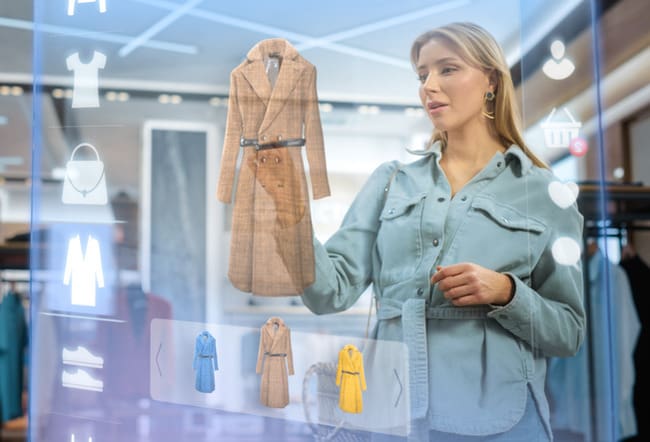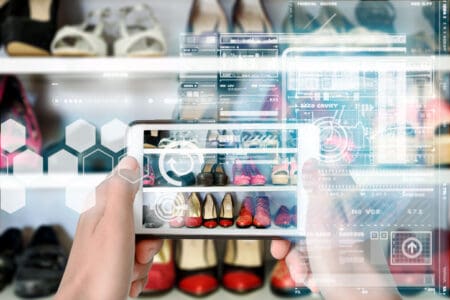Virtual reality (VR), mixed reality (MR) and augmented reality (AR) are emerging fabricated experiences created to emulate this world or to create entirely new ones for a user to immerse themselves. With the success of Pokemon Go in 2016, more and more consumers are discovering ways they can use AI in their everyday lives and brands need to become more aware of this digital change. Recent advancements and innovations have led to some impressive and usable technology for brands to engage and impress consumers.
How Apple is Using AR
Since the discontinuation of Google Glass in 2015, technology brands have begun introducing their own Immersive Technology headsets. This includes Apple who is developing spatial computing devices which allow users to interact with virtual objects to completely transform how we process digital content. The device will allow users to keep a completely clear desk because everything they need (web browsing, note taking, FaceTime) will be integrated into an immersive experience. Meetings will feel much more in touch with reality because it will appear as if your colleagues are in the room with you.
Rumoured to be released in 2024, Apple Glasses are a more economical alternative designed to provide AR interactive experiences without the bulky headset. Additionally, it’s been reported that Google itself is working with Samsung to hopefully realise a more successful mixed-reality platform, so we may be expecting immersive headsets from them in Summer 2024.
These products not only benefit consumers but there is an opportunity for brands to use them for their advantage. With the option to browse the internet, brands need to understand how they can use this reality-like experience for marketing and advertising purposes.
AR Has Serious Benefits for Online Retailing
Online retail is seeing more and more uses for AR, particularly when it comes to virtual fitting rooms. 64% of female online shoppers stated that having to judge an item’s fit online created difficulties for them. AR would open up opportunities for shoppers to try on their potential outfits online, therefore proactively reducing the chance of later returns. John Lewis is one example of a clothing brand that is forward-thinking with AR. Working alongside AI imaging company Zyler, the John Lewis try-on feature can be used for fashion rentals and already seems to be outperforming competitors on usability.

The beauty industry has also recognised the importance of the try-before-you-buy model. Sephora and Estée Lauder have implemented colour-matching AR to help users find their perfect make-up shade. This will be revolutionary for the facial skin care industry, especially with mounting pressure to cater for a more diverse range of skin tones. Brands need to understand the benefits AR can have on enhancing their offering and providing consumers with a more in-depth experience to encourage them to purchase their products.
AR helps consumers see products on themselves and in real-world situations, like superimposing wallpaper into living spaces to see if it matches existing furniture. How a product fits into existing room layouts, be it through size, shape or colour, is incredibly important from a customer point of view. Our Furniture Retailing UK 2023 Report highlights that 67% of furniture buyers feel it is important to view furniture physically before buying online.
IKEA Place launched in 2017 and set the precedent for augmented reality furniture shopping. The app allows users to place true-to-scale models of the product in their own space, aiding experimentation with placement and helping to make an informed decision. With the introduction of the LIDAR sensor on iPhones, a technology that can create 3D models and maps of the environment, the AR experience can reach new heights. Retailers need to make more use of this technology in order to stand out and provide a unique customer experience.
Benefits of Augmented Reality
Considering AR from a sustainability perspective is essential. One great way for companies to reduce their carbon footprint is to hold virtual meetings. Over half of those who travel for business reported that if meeting online felt closer to real life, they would feel encouraged to travel less. This clearly outlines a need for more robust and usable virtual meeting technology. Companies have already added fun AR backgrounds so that meetings appear to be held on a beach or in a chic Parisian apartment, but this doesn’t improve their realness. Previously mentioned upcoming technology like Apple Reality Pro will hopefully provide new solutions for this disconnect.
Finally, the use of AR in the entertainment industry proves that it will still hold onto its light-hearted beginnings. The extremely popular ABBA Voyage concerts are a testament to people’s willingness to try out this unfamiliar technology in real life. Many festival providers are working to enhance streamed performances for those who could not attend. Last year, the US festival Coachella offered augmented lifestream performances of sets, thrilling viewers with psychedelic imagery. In our UK Music Concerts and Festivals Report, just over 40% of those surveyed said they would be interested in live performances enhanced by virtual or augmented reality.
Looking Ahead with Mintel
The world of immersive technology has undergone significant advancements and transformations in recent years. AR, in particular, has gained widespread popularity and respect, moving beyond its initial use in novelty games and filters to become a technology with more practical applications. AR is poised to become an integral part of consumers’ daily lives, offering innovative and practical solutions to a wide range of challenges and opportunities. The more seamless brands can make this, the better they will perform in the coming years.
Explore our extensive Technology Market Research, or fill out the form below to sign up for Spotlight, Mintel’s free newsletter for exclusive insights.










































